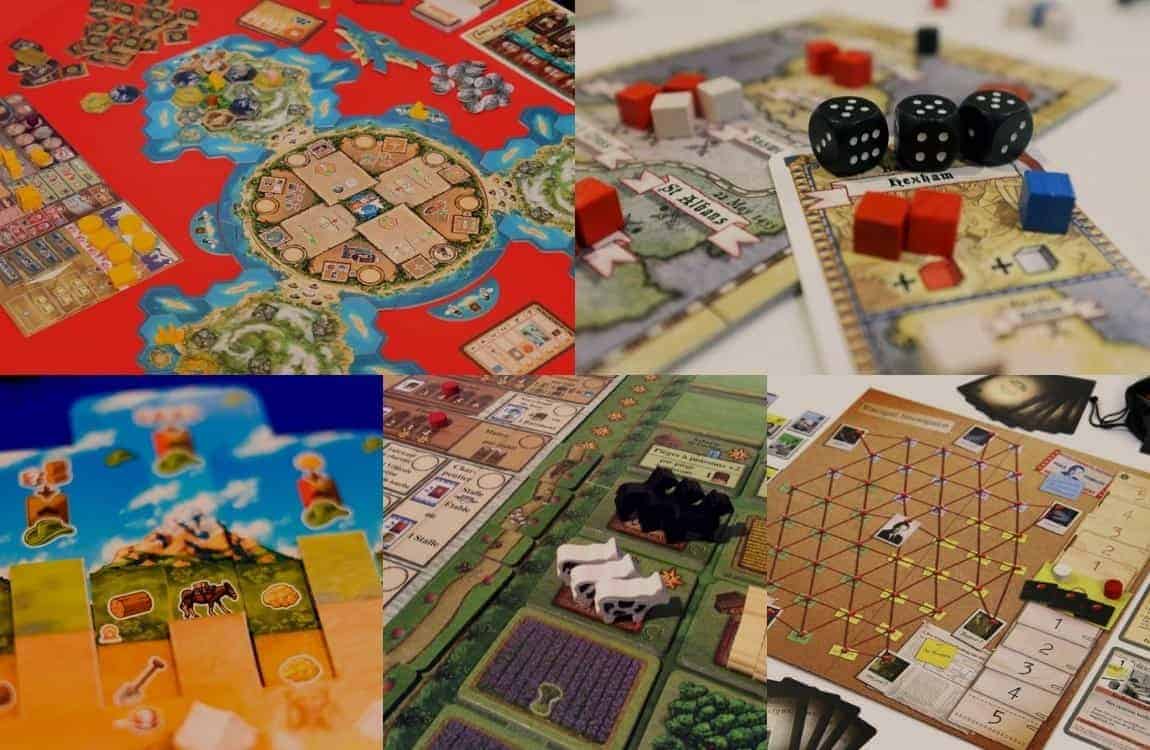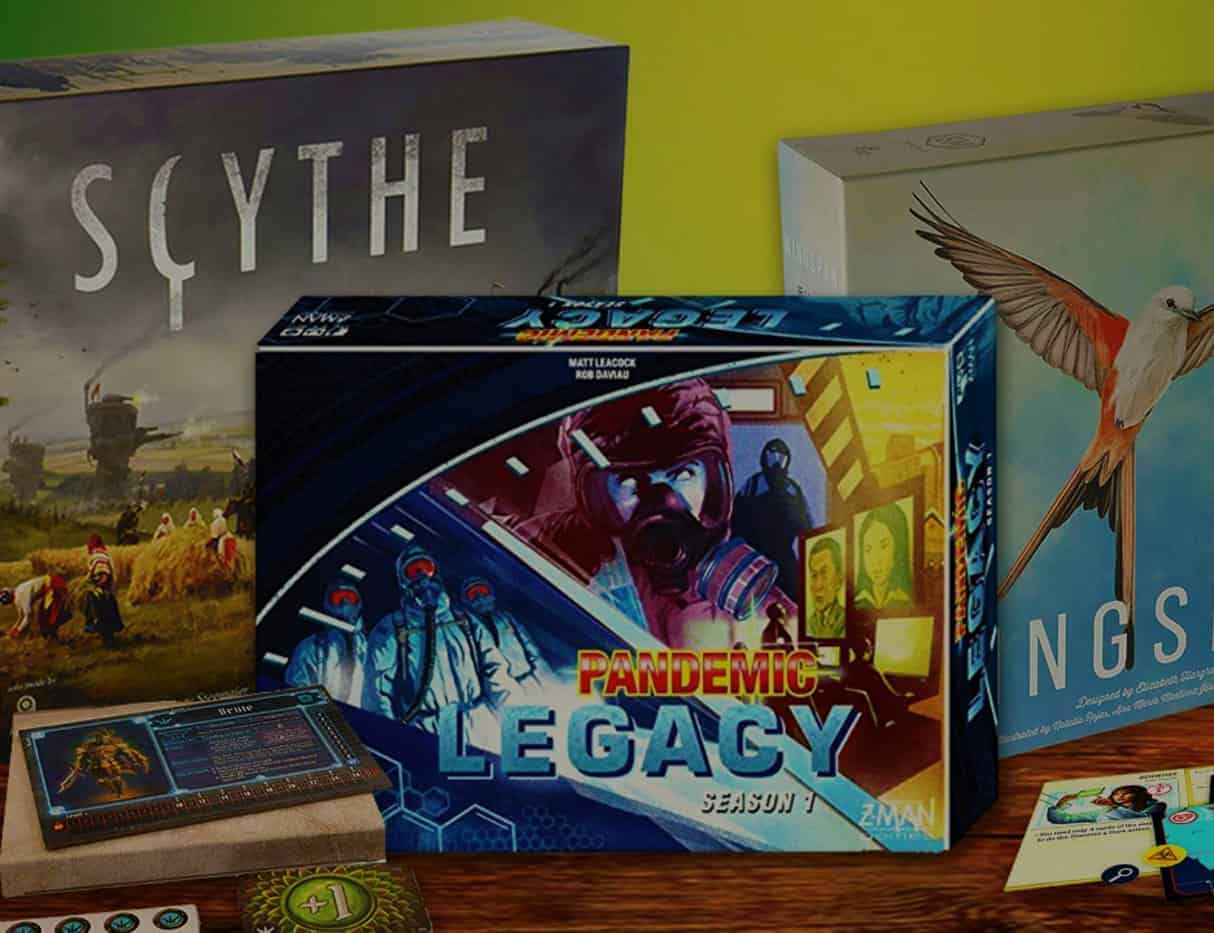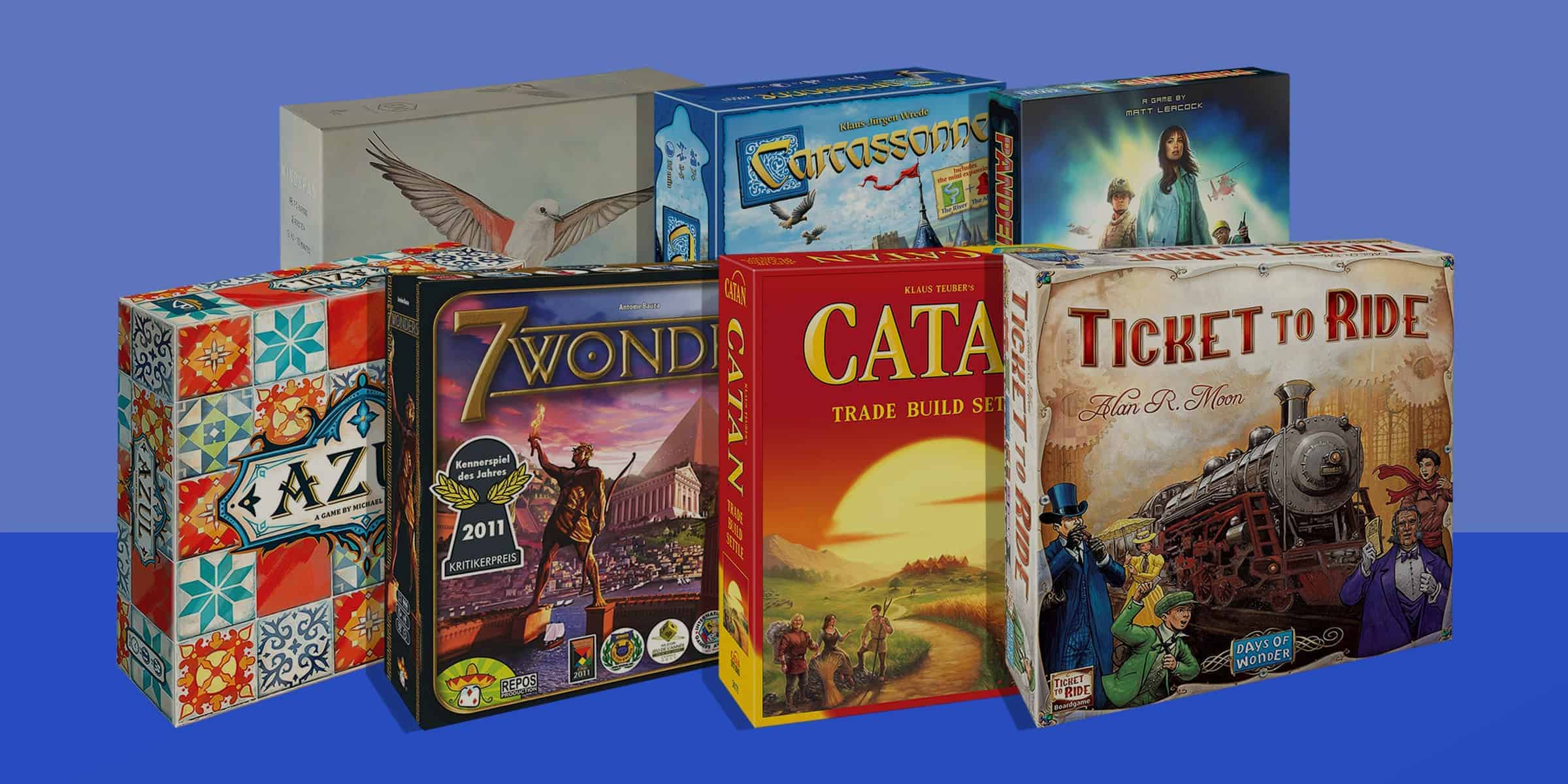We’ve posted about different types of board games on this site, and now it is time to dive a bit deeper into our favorite kind, the German-style board games, also known as euros for short. First, we will answer why eurogames are our favorite and why the board game community appreciates them. Then, we aim to make you understand everything before considering buying a eurogame. So, without further ado, here we go:

What Defines the German-Style Board Game
According to the wiki, a Euro-style board game is a tabletop genre with simple rules, short to medium play times, indirect player interaction, and abstract physical components. This definition is a bit outdated, especially for modern eurogames. On the other hand, some people on Reddit claim that there is a distinction between classic German Style Games and modern eurogames. However, we think that the difference is negligible and more like an evolution rather than a separate genre.

The Development of the German-Style Games Genre
Thanks to the fast-growing industry and modernization of the printing services, euro-styled board games are not the “dry euros” players once called them. On the contrary, publishers have made many beautiful eurogames throughout the years with cheaper and higher quality materials at their disposal. So much so that they could stand shoulder to shoulder with their more thematic counterparts like RPG games. There are also the crossbreeds like Dune Imperium or Ruins of Arnak that incorporate both elements. In other words, eurogames have evolved. However, no matter how much they evolve, one thing will always remain constant. Eurogames will always have the smoothest game mechanics, which makes the rules not so hard to understand once you have played a couple of times.
German-Style Board Games Today
The term “Euro” or “German” game suggests that they were once most popular in Germany. However, in present times they are popular in the rest of the world too. The Essen Game Fair, or Essen Spiel in Germany, is the world’s most fabulous board game fair. They are bringing tens of thousands of new enthusiasts each year from all around the world. Also, the Essen Spiel des Jahres reward for the best game of the year is equivalent to the Oscar reward for a movie. This event has created a tremendous ripple effect making eurogames the standard genre that every publisher strives for today.
What Characterizes the German-Style Board Game
Now that we know a little bit more about eurogames let us dive deep into what characterizes a German-style board game. What is the core element that makes the board game a euro? To answer this question, we need to turn to BGG. According to Board Game Geek, most Euro games comprise these main elements:

- Player conflict is indirect and involves competition over resources and points. Combat is extremely rare.
- Players are never eliminated from the game (All players are still playing when the game ends.)
- There is very little randomness or luck. Randomness is mitigated by having the player decide what to do after a random event happens rather than before. Dice are rare, but not unheard of, in a Euro.
- Eurogames are concerned with getting the most strategy from the least or minimal mechanics.
- The designer of the game is listed on the game’s box cover.
- Eurogames typically have multiple viable paths to scoring points or securing the win condition.
In conclusion, we can say that instead of rolling dice and destroying your opponents in a dramatic way, like in the RPG games, eurogames tend to have more engine building and strategy. The rewards are gained by the most efficient or cunning player going for the alternate victory. We think this is the best definition that describes eurogames for what they indeed are.
Eurogames Are Good for Social Play
Another aspect that defines Eurogames is that they tend to be more convenient for social play. Once everybody understands the rules, you can play immediately, although we recommend the more thematic approach as a far better teaching method. However, if your gaming group is anxious, you can start immediately. Most euros have clearly defined winning conditions, and the game phases are easy to learn, too, once the players understand the iconography. Usually, it goes like this: you use your worker pieces to get the resources, and then you use those to fulfill some condition for victory points. Players count their points at the end, and the one with the most points wins. Once the players grasp this simple mechanic, they are ready for all eurogames, no matter how complex.

Nevertheless, we recommend you have a trial game first and not worry much about the victory conditions. Instead, pay attention to the game’s phases to feel the game’s flow. Also, always start with the simpler variant, and after you finish your first game, you can play for the challenge.
All Players Stay in the Game Until the End
Furthermore, there is no player elimination in eurogames. So that is another plus for the social aspect. No matter how badly the players are doing, the game will take all of them to the end. Some spicier euros allow a catch-up mechanic that might save a player from an inevitable defeat. However, this does not mean those players are free to do what they want in the game without someone else impeding their progress. Most euros have a clever way of making players interact without wrecking each other. For example, blocking a place with your piece or taking a card that someone else wants is a very common mechanic in eurogames. Some Euros have more serious “take that” mechanics that affect your opponent directly, like stealing resources or giving negative points. Usually, they also have a non-aggressive variant for those players who do not want that type of interaction.

Suitable for International Audience
An even more exciting fact about eurogames is that most are language-independent. Consequently, this makes them suitable for an international audience, and everyone can truly enjoy them. Of course, this is our favorite part about eurogames. Instead of reading long texts, we can enjoy the iconography and have fun with the story in our way. Moreover, this relieves a lot of pressure from the publishers when it comes to shipping in different countries. All they have to do is translate the rulebook, and all other components stay the same. Another side benefit that is even more important is that no matter in what language the publisher initially printed the game, the owner can still trade it around the world. The new owner has to print the rulebook in their language, and viola, they are ready to play.
Various Board Game Mechanics
Moreover, eurogames are also valued for their various mechanics, especially if they are cleverly tied to the theme. For example, one of the best eurogames, Tzolkʼin, has a rotating wheel representing the mysterious Mayan calendar engraved with Mayan symbols. Also, the game uses corn chits as currency, and we know that corn is the cornerstone of Mayan culture and spirituality. Some other games go a little further and mash-up more than one mechanic creatively, so players feel that they are playing more than one game at a time. All of This provides diversity and alternative strategies that we, as players, like to discuss after the game ends.
Some eurogames use unique mechanics like Manitoba, for example, by flipping discs. Other games like Groves and Orleans differ from standard deck building by replacing the mechanic with bag building instead. All these mechanics provide fresh experiences which make each eurogame desirable.
Prominent German-Style Board Game Authors
One of the easiest ways to spot a German-style game is to see if the designer is on the cover box, according to BGG. We can’t be sure why that is specifically with eurogames, but we can speculate that it has to do something with the excellent game designers for these games. Some of these people gained a lot of fame in the board game community, and their games have made the standard that all new designers should adhere to. For example, Uwe Rosenberg is best known for his farming and puzzle euros, among others sold in tens of thousands. His most famous one Agricola sold 60,000 copies, which grows yearly. He is one of the first board game designers to make games since 1997. Martin Wallace is the king of economic and business games. His game Brass returns every few years in a new, updated version. Stefan Feld is known for the creative use of dice and other components in games, for which he won numerous awards. Finally, Bruno Cathala is considered the best designer in the world. His games are unique, a perfect mix of theme and mechanics, which only he can make. However, others claim that that title belongs to Reiner Knizia and his legion of masterpieces like Tigris & Euphrates. There are many other great ones, but we will mention them later.

Best German-Style Board Game Publishers
However, board game designers are not the only ones that get all the glory for great euro games. Numerous publishers are also loved and respected by the community, with diehard fans who can’t wait for their next big hit. One of the earliest publishers is Mayfair games, which published some great eurogames like Agricola, Settlers of Catan, Le Havre, Tigris & Euphrates. Z-man games continued their work after the company went under, working closely with creators like Uwe Rosenberg to make new masterpieces like a feast for Odin, one of the best euros ever created.
Pegasus Spiele is the most outstanding German publisher, which has the most euro games with the Spiel des Jahres award. As we mentioned above, winning this award is the same as winning the Oscar.
Days of Wonder has made one of the greatest Euros, which is sold close to 8 million copies and has tons of versions too. They are also known for other hits like Five tribes and Shadows Over Camelot.
Stonemaier is the most significant publisher because almost all of its games are unique worlds. Furthermore, the customer support they offer is beyond anything else. Jamey Stegmaier, the CEO, and co-founder of Stonemaier Games, goes live every Wednesday to discuss everything related to board games. There are many others too which we will not mention now, but for now, we hope that we have provided you with some detailed insight into eurogames, and we hope that you will like them as much as we do.


Thanks for posting this! Medium-weight Euro games are my sweet spot as a gamer, designer, and publisher, and I like how you updated the older wiki definition. I particularly like the level of agency I have in Euro-style games–I’m presented with interesting, compelling decisions for which I know all or most of the outcomes.
The “designer’s name on the box” comes from early Euro marketing.
Gamers were encouraged to purchase and play new games fairly often.
This was a major contrast to the hobby market where a single game is meant to be played a lot.
So Euro designers would create a series of games that act as variations on a theme rather than making many expansions for a single game.
Today, we generally see designers named on all games, but that is really because there is a lot less distinction between the gaming markets now.